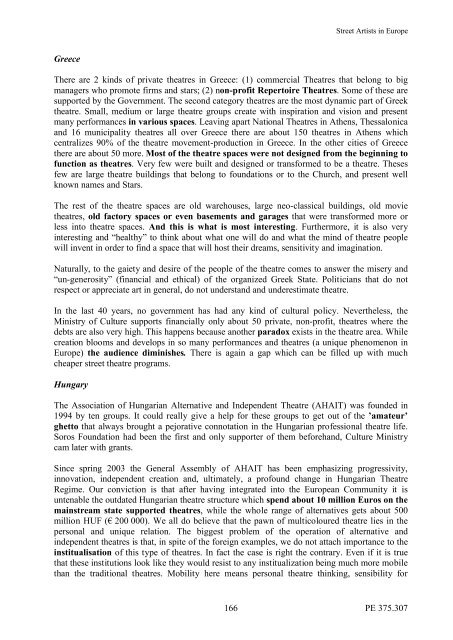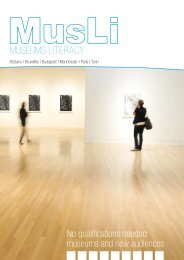STREET ARTISTS IN EUROPE - Fondazione Fitzcarraldo
STREET ARTISTS IN EUROPE - Fondazione Fitzcarraldo
STREET ARTISTS IN EUROPE - Fondazione Fitzcarraldo
You also want an ePaper? Increase the reach of your titles
YUMPU automatically turns print PDFs into web optimized ePapers that Google loves.
Greece<br />
166<br />
Street Artists in Europe<br />
There are 2 kinds of private theatres in Greece: (1) commercial Theatres that belong to big<br />
managers who promote firms and stars; (2) non-profit Repertoire Theatres. Some of these are<br />
supported by the Government. The second category theatres are the most dynamic part of Greek<br />
theatre. Small, medium or large theatre groups create with inspiration and vision and present<br />
many performances in various spaces. Leaving apart National Theatres in Athens, Thessalonica<br />
and 16 municipality theatres all over Greece there are about 150 theatres in Athens which<br />
centralizes 90% of the theatre movement-production in Greece. In the other cities of Greece<br />
there are about 50 more. Most of the theatre spaces were not designed from the beginning to<br />
function as theatres. Very few were built and designed or transformed to be a theatre. Theses<br />
few are large theatre buildings that belong to foundations or to the Church, and present well<br />
known names and Stars.<br />
The rest of the theatre spaces are old warehouses, large neo-classical buildings, old movie<br />
theatres, old factory spaces or even basements and garages that were transformed more or<br />
less into theatre spaces. And this is what is most interesting. Furthermore, it is also very<br />
interesting and “healthy” to think about what one will do and what the mind of theatre people<br />
will invent in order to find a space that will host their dreams, sensitivity and imagination.<br />
Naturally, to the gaiety and desire of the people of the theatre comes to answer the misery and<br />
“un-generosity” (financial and ethical) of the organized Greek State. Politicians that do not<br />
respect or appreciate art in general, do not understand and underestimate theatre.<br />
In the last 40 years, no government has had any kind of cultural policy. Nevertheless, the<br />
Ministry of Culture supports financially only about 50 private, non-profit, theatres where the<br />
debts are also very high. This happens because another paradox exists in the theatre area. While<br />
creation blooms and develops in so many performances and theatres (a unique phenomenon in<br />
Europe) the audience diminishes. There is again a gap which can be filled up with much<br />
cheaper street theatre programs.<br />
Hungary<br />
The Association of Hungarian Alternative and Independent Theatre (AHAIT) was founded in<br />
1994 by ten groups. It could really give a help for these groups to get out of the ’amateur’<br />
ghetto that always brought a pejorative connotation in the Hungarian professional theatre life.<br />
Soros Foundation had been the first and only supporter of them beforehand, Culture Ministry<br />
cam later with grants.<br />
Since spring 2003 the General Assembly of AHAIT has been emphasizing progressivity,<br />
innovation, independent creation and, ultimately, a profound change in Hungarian Theatre<br />
Regime. Our conviction is that after having integrated into the European Community it is<br />
untenable the outdated Hungarian theatre structure which spend about 10 million Euros on the<br />
mainstream state supported theatres, while the whole range of alternatives gets about 500<br />
million HUF (€ 200 000). We all do believe that the pawn of multicoloured theatre lies in the<br />
personal and unique relation. The biggest problem of the operation of alternative and<br />
independent theatres is that, in spite of the foreign examples, we do not attach importance to the<br />
institualisation of this type of theatres. In fact the case is right the contrary. Even if it is true<br />
that these institutions look like they would resist to any institualization being much more mobile<br />
than the traditional theatres. Mobility here means personal theatre thinking, sensibility for<br />
PE 375.307






